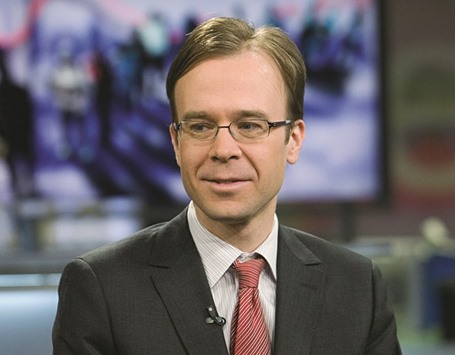Jan Hatzius, the chief economist at Goldman Sachs Group, warned bond investors aren’t prepared for the Federal Reserve to raise interest rates.
Fed Bank of Atlanta President Dennis Lockhart and his San Francisco counterpart John Williams both said on Tuesday at least two rate increases may be warranted this year as the economy picks up.
Their comments echo those of Bill Gross, the former manager of the world’s biggest bond fund, who said this month not to count the Fed out after a weaker-than-forecast jobs report.
The views of the Fed officials, who aren’t voting members of the Federal Open Market Committee, contrast with the Treasuries market, where the range of maturities comprising the yield curve signals that investors are preparing for slowing inflation as much as higher borrowing costs. Demand for long- term debt has narrowed the yield premium on 10-year notes over two-year securities to as little as 92 basis points, the least since 2007. The Fed is set to issue the minutes of its most recent meeting.
“The market’s underestimating their willingness to follow through on what they say,” Hatzius said on Tuesday in an interview on Bloomberg Television. “If you look at where the yield curve is priced - how little normalisation of monetary policy is discounted - that’s very striking.”
Benchmark 10-year Treasuries were little changed Wednesday, with the 10-year note yield at 1.78% in New York, according to Bloomberg Bond Trader data. The price of the 1.625% security maturing in May 2026 was 98 19/32.
Hatzius also said in February the bond market was underestimating the Fed, and he predicted 10-year yields would rise to about 3% by year-end.
They’ve fallen about six basis points from the closing level on February 4 when he made the comments. Goldman Sachs is one of the 23 primary dealers that trade with the US central bank.
Futures contracts show a 14% probability policy makers will raise rates a quarter-point at their next meeting on June 14-15. The chances of a shift by year-end are 67%, according to data compiled by Bloomberg based on fed fund futures.
The market is signalling a risk of a contraction, said Steve Major, head of fixed-income research at HSBC Holdings in London. Long-term yields are declining worldwide as central banks, including the Fed, struggle to spur inflation, he said.
“The yield curve itself signals that things are not good looking into the future and talking about recession risk,” Major said in an interview on Bloomberg Television on Monday.
Investors might be right in assuming the Fed will be cautious about raising rates, said Christoph Kind, head of asset allocation at Frankfurt Trust, which oversees about $20bn. Even so, long-dated Treasuries are expensive, he said.
Treasuries have returned 3.6% this year, according to Bank of America Merrill Lynch indexes. Securities maturing in one to three years have earned 0.9%, while those due in 10 years and longer gained about 9%.
“We are cautious about long-dated bonds,” said Kind, who’s based in Frankfurt. “It is a tough market to call as it’s difficult to understand the Fed’s reaction function these days. The market might be right to price out rate hikes, but valuations of these long-dated bonds are not attractive in our view given the amount of risk.”

Hatzius: Cautious approach.
